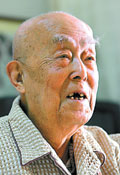The Chinese are busy boning up on English, but few know that many English words have roots in the language of their neighbor India.
"Mandarin", the English word for an official in imperial China, for example, is derived from the Sanskrit word "mantri", which means counselor; and "orange" has its origins in the Sanskrit name of the fruit.
It is through the efforts of Ji Xianlin-considered by many to be the country's foremost Indologist-and his students that many Chinese got to know the language of Sanskrit, the epic Ramayana and other achievements of Indian civilization.
In a rare honor, the Indian government conferred Ji the Padma Bhushan-one of the country's top civilian awards-on Republic Day on Saturday. The 97-year-old scholar is the first Chinese to receive the award.
Wang Bangbei, a professor of Sanskrit at Peking University, told the Times of India newspaper: "This is a great event. The award will have a positive effect on the way ordinary Chinese look at India."
Ji chose to major in Sanskrit in 1936, when he was a student at the University of Gottingen in Germany. The reason was that "Chinese culture has been so much influenced by Indian culture, and great discoveries can be made in research on the two nations' cultural relationship," he wrote in his best-selling biography 10 Years in Germany.
In the following seven decades, he made discoveries not only about the spread of Buddhism from India to China but also about the export of the skills of making paper and silk from China to India.
He wrote seven books, including a short history of India, apart from translating Ramayana from the original Sanskrit to Chinese in poetry form.
He did the translation secretly during the "cultural revolution" (1966-76). His memoir of the 10-year turmoil, titled Memoirs from the Cowshed and published in 1998, touched the hearts of millions of Chinese readers with the dignity of an intellectual in the face of both physical and mental torture.
(China Daily January 28, 2008)


